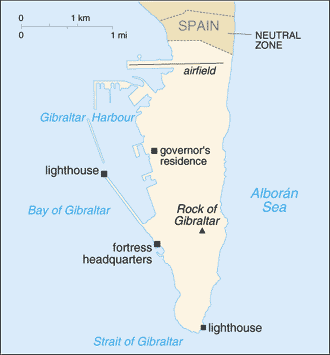Welcome to the Virtual Education Wiki ~ Open Education Wiki
Gibraltar
Partners situated in Gibraltar
None.
Gibraltar in a nutshell

Gibraltar is a self-governing overseas territory of the United Kingdom located on the southern end of Spain at the entrance of the Mediterranean overlooking the Strait of Gibraltar.
The territory covers 6.8 square kilometres (2.6 sq mi) and shares a land border with Spain to the north. Gibraltar has historically been an important base for the British Armed Forces and is the site of a Royal Navy base.
According to the Jane's Country Risk Ratings 2008, which measures the stability of 235 countries, territories and political entities in the world, Gibraltar is the 5th most stable territory worldwide, and the highest ranked British territory. The ratings are based on five fundamental categories: political, social, economic, external and military and security.
The sovereignty of Gibraltar has been a major point of contention in relations between the UK and Spain. Gibraltar was ceded by Spain to the Crown of Great Britain in perpetuity, under the 1713 Treaty of Utrecht, though Spain asserts a claim to the territory and seeks its return. The overwhelming majority of Gibraltarians strongly oppose this, along with any proposal of shared sovereignty. The British government has stated that it is committed to respecting the Gibraltarians' wishes. Despite seeming to most to have self-government, Gibraltar remains on the UN list of "non-self-governing territories", presumably as Spain opposes any attempt to remove it from the list.
Its population is around 29,000.
Its capital is Gibraltar (town=city=country).
The name Gibraltar is the Spanish derivation of the Arabic name Jabal Tāriq (جبل طارق), meaning "mountain of Tariq". It refers to the geological formation, the Rock of Gibraltar Earlier, it was known as Mons Calpe, one of the Pillars of Hercules. Today, Gibraltar is known colloquially as Gib or The Rock.
Resources are an issue. Having negligible natural resources and few natural freshwater resources, limited to natural wells in the north, until recently Gibraltar used large concrete or natural rock water catchments to collect water. Fresh water from the boreholes is now supplemented by two desalination plants: a reverse osmosis plant, constructed in a tunnel within the rock, and a multi-stage flash distillation plant at North Mole
The British military traditionally dominated the economy of Gibraltar, with the naval dockyard providing the bulk of economic activity. This has however diminished in the last 20 years, and it is estimated to account for only 7% of the local economy, compared to over 60% in 1984. Today, Gibraltar has an extensive service-based economy, dominated by financial services and tourism. Recently, many bookmakers and online gaming operators have relocated to Gibraltar to benefit from operating in a regulated jurisdiction with a favourable corporate tax regime. However, this corporate tax regime for non-resident controlled companies is due to be phased out by 2010. Tourism is also a significant industry. Gibraltar is a popular stop for cruise ships and attracts day visitors from resorts in Spain. The Rock is a popular tourist attraction, particularly among British tourists and residents in the southern coast of Spain. It is also a popular shopping destination, and all goods and services are VAT free. Many of the large British high street chains have branches or franchises in Gibraltar.
The currency is pounds sterling, as in the UK. The Government of Gibraltar issues banknotes that are legal tender alongside Bank of England banknotes in Gibraltar. Clearing and settlement of funds is conducted in sterling, and Gibraltar banknotes in circulation bear the words "Pounds sterling".
Most retail outlets in Gibraltar unofficially accept the euro, though some payphones and the Post Office do not.
One of the main features of Gibraltar’s population is the diversity of their ethnic origins. The demographics of Gibraltar reflects Gibraltarians' racial and cultural fusion of the many European and non-European immigrants who came to The Rock over three hundred years. They are the descendants of economic migrants that came to Gibraltar after the majority of the Spanish population left in 1704. The main ethnic groups, according to the origin of names in the electoral roll, are Britons (27%), Spanish (26%, mostly Andalusians but also some 2% of Minorcans), Genoese and other Italians (19%), Portuguese (11%), Maltese (8%), and Jews (3%). There is a large diversity of other groups such as Moroccans, Indians, French, Austrians, Chinese, Japanese, Polish or Danish.
Gibraltar's main religion is Christianity, with the majority (78%) of Gibraltarians belonging to the Roman Catholic Church.
As a British overseas territory, the sole official language of Gibraltar is English, and it is used by the Government and in schools. Most locals are bilingual, also speaking Spanish, due to Gibraltar's proximity to Spain. However, because of the varied mix of ethnic groups which reside there, other languages are spoken on The Rock. Arabic is spoken by the Moroccan community, as are Hindi and Sindhi by the Indian community of Gibraltar. Hebrew is also spoken by the Jewish community and the Maltese language is still spoken by some families of Maltese descent.
Gibraltarians often converse in Llanito, an Andalusian Spanish-based vernacular unique to Gibraltar - consisting of an eclectic mix of Andalusian Spanish and British English as well as Maltese, Portuguese, Italian (Genoese variety) and Haketia (Ladino).
Gibraltar education policy
Gibraltar education system
Higher education
Universities in Gibraltar
(this is an important section)
Polytechnics in Gibraltar
Higher education reform
The Bologna Process
(very important for European countries)
Administration and finance
Quality assurance
Gibraltar HEIs in the information society
Towards the information society
Information society strategy
Virtual Campuses in HE
Interesting Virtual Campus Initiatives
(another very important section)
Interesting Programmes
Re.ViCa Case-study
None.
Lessons learnt
None.
References
(try to add one or two)